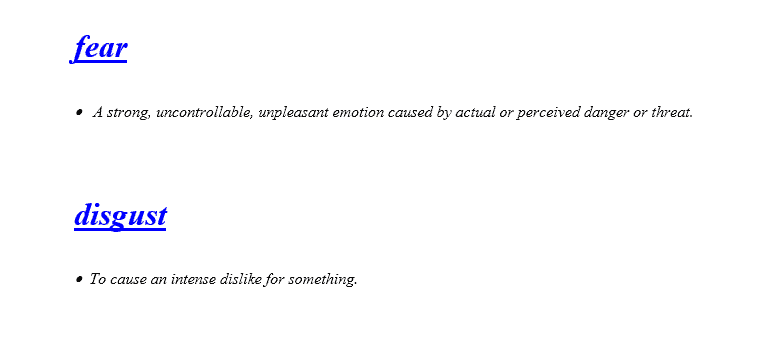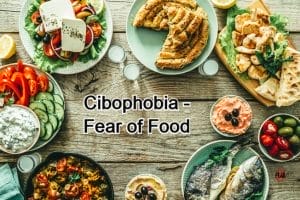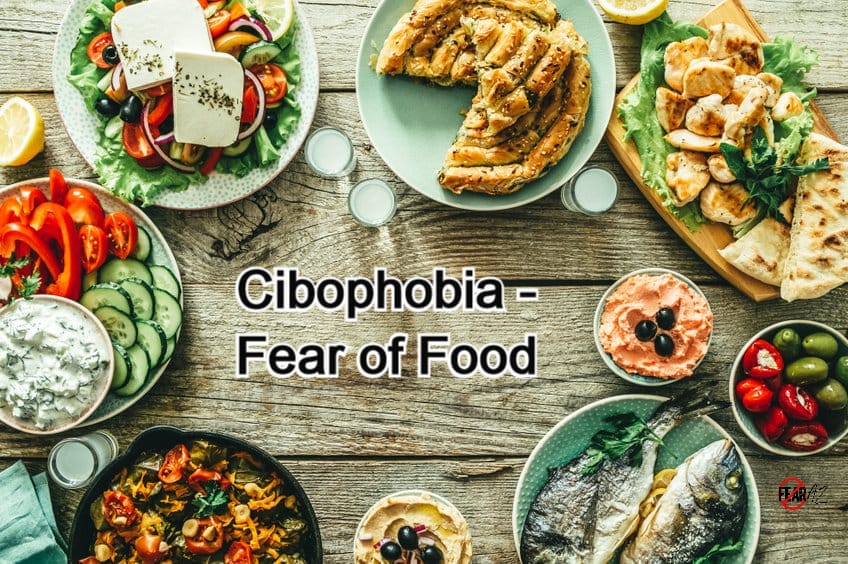Share This Article
Digesting Cibophobia – The Fear of Food
Do you—without exception—avoid eating or drinking? Does the thought of sitting down for a meal scare the living daylights out of you?
Does your refrigerator sit empty? Are your dishes collecting dust? Do you avoid going out to lunch with friends because the sight of food might trigger a panic attack?
Or perhaps it’s something specific you avoid, like hamburgers or a cheesey pizza. Fast food joints have become your worst nightmare and the thought of a greasy burger sends you running for the hills.
If any of these scenarios sound familiar, it’s possible you may suffer from cibophobia, or a fear of food. This troubling phobia can develop either out of fear or disgust.

Strange as it might seem, fear of food is real. Anxiety over food can evolve into an obsessive-compulsive disorder. Let’s decode this fear of food and learn how to cope with cibophobia.

What Is Cibophobia?
What phobia is the fear of food? Cibophobia is defined as a fear of food. It is a complex phobia that can evolve into an obsession. Those who suffer from cibophobia typically avoid meals, because they are fearful of the food itself. The phobia may be limited to a particular type of food, or it may involve a variety of foods.
People who have this phobia are often misidentified as having anorexia, an eating disorder. However, those suffering from anorexia are anxious about the impact of food on their body while those suffering from cibophobia are scared of the food itself. Some may have both disorders triggered at the same time.
Cibophobia usually follows a pattern. Some are scared of perishable foods like dairy. Others are afraid of undercooked meat or products that are nearing their expiration dates. This might be related to an experience with eating these perishable food products which resulted in food poisoning or digestive problems. When presented with phobic stimuli, the brain recalls those experiences.
Some individuals who suffer from cibophobia are scared to cook, while others refuse to consume food prepared by others.
Cibophobia Causes
Phobia and aversion to food, eating, or consuming fluids can also result from an unpleasant or traumatizing incident. This could include choking, purging, or other bodily functions after eating or drinking. Some people have this phobia even after they reach adulthood. Cibophobia causes are frequently linked to anorexia, bulimia, and other behavioral and eating disorders.
Cibophobia can result in several health problems, mental health disorders, and emotional turmoil.
It can also be caused by anxiety about developing a sensitivity or allergy to certain foods. What starts as a mere aversion combined with other unaddressed mental health issues may, over time, develop into a fear of food phobia causing increased anxiety and disturbances in everyday life.
Symptoms of Cibophobia
As humans, we rely on food to survive. It provides us with the essential nutrients required for our health and well-being. A fear of food can lead to varied issues that impact a person’s life adversely. Cibophobia sufferers experience a wide range of physical and mental health symptoms as a result of their condition. Some of these are listed below:
Mental/Emotional Symptoms
- Anxiety
- Body dysmorphia
- Anorexia
- Bulimia nervosa
- Obsessive-compulsive disorder
- Depression
- Inability to concentrate
- Panic attacks
- Insomnia
- Behavioral issues
Physical Symptoms
- Chest pain
- Excessive sweating
- Rapid heartbeat
- Difficulty breathing
- Tremors
- Shivering
- Stomach cramps
- Nausea
- Vomiting
- Unhealthy weight loss
- Low bone density
- Malnourishment
- Memory loss
Coping with Cibophobia
As previously discussed, the major problem with having a fear of food is that it may impact your dietary intake. Consequently, the likelihood of having other mental and physical health issues may increase. That’s why it’s critical to learn how to cope with cibophobia to overcome your fear and live a healthy life.
Self-Help: What Can You Do to Help Yourself?
When it comes to being afraid of food, try some of the following tips to help better manage your phobia:
- Change your perspective about food
- Face your aversion to some foods
- Experiment with new foods
- Allow yourself to eat out
- Let someone else prepare your meals
- Talk to someone about your phobia
In addition to this, you can cope with anxiety caused by cibophobia in many different ways. Certain lifestyle adjustments have been shown to alleviate anxiety symptoms. Practicing meditation, for example, has been found to improve stress management and promote calmness.
Breathing and mindfulness exercises can also help with symptoms of agitation, rage, anxiety, and depression. Regulated and mindful breathing can assist to control your central nervous system and reduce the stress-inducing effects of your phobia.
Seeking Professional Help: Available Options
Dealing with a phobia or any mental health problem can be difficult, but you don’t have to go through it alone. You can always talk with those you trust. Joining support groups for certain mental health problems could also be helpful.
Phobias need to be taken seriously or they may progress into severe anxiety disorders. If you’re unable to cope with your fear of food with self-help methods, it’s important to get cibophobia treatment from a mental health specialist. Treatments may include:
Exposure Therapy
This carefully controlled and progressive therapy gradually exposes you to the foods that scare you. You can learn to control your anxiety and responses in a supportive environment with this therapy.
Treatment may include desensitization, which involves progressively introducing the feared food until the patient is no longer afraid of eating it. The patient may be requested to perform a set of actions, such as touching the food, sitting close to it, bringing it close to their mouth, chewing, and swallowing it.
Hypnotherapy
Another alternative is hypnotherapy. It enables a practitioner to interact with a patient’s subconscious to discover fears and thoughts. They will then work with you to overcome these assumptions.
Your brain is susceptible to reconditioning in this deeply calm state. A hypnotherapist may give recommendations or provide verbal cues to enable you to minimize your unpleasant responses to food.
Cognitive Behavioral Therapy (CBT)
Cognitive behavioral therapy is the most commonly used treatment for phobias and other anxiety disorders. This treatment entails discussing your feelings and food experiences with a mental health specialist. Your therapist will work with you to identify and alter any underlying perceptions you have about the foods you fear.
Medication
Your doctor will advise you on which medications are appropriate for you. Specific phobia symptoms may necessitate the use of antidepressants, beta-blockers, and benzodiazepines.
These medications may be able to alleviate the anxiety symptoms linked with your phobia. Your doctor may prescribe something for a short period and then have you taper off the prescription when your anxiety decreases to a reasonable level.
How to Avoid Cibophobia Altogether
Avoiding cibophobia altogether depends on the type of food you fear. However, some of these general tips might help:
- Avoid keeping dairy products at home
- Avoid meat and poultry
- Buy the ingredients yourself
- Make sure you are buying the freshest of products
- Check expiry dates carefully
- Wash and sanitize your fruits and vegetables
- Never store leftovers in the refrigerator
- Always keep a close eye on your meal
- Steer clear from foods that trigger your phobia
- Avoid eating where you don’t know what goes into the food
- Bring your own food if you’re eating out
- Get your food allergies and sensitivities checked by a professional
Wrapping It Up
Several factors contribute to cibophobia. There are also several therapeutic alternatives available to alleviate your symptoms. If you feel cibophobia is interfering with your everyday life—in particular, preventing you from eating and getting proper nourishment—make an appointment with a medical professional immediately.
This is an important first step in receiving diagnosis and effective therapy. It can help you in overcoming your fears and developing a positive attitude towards food. Give yourself the time and help you need to overcome your phobia. Things will improve with time.



